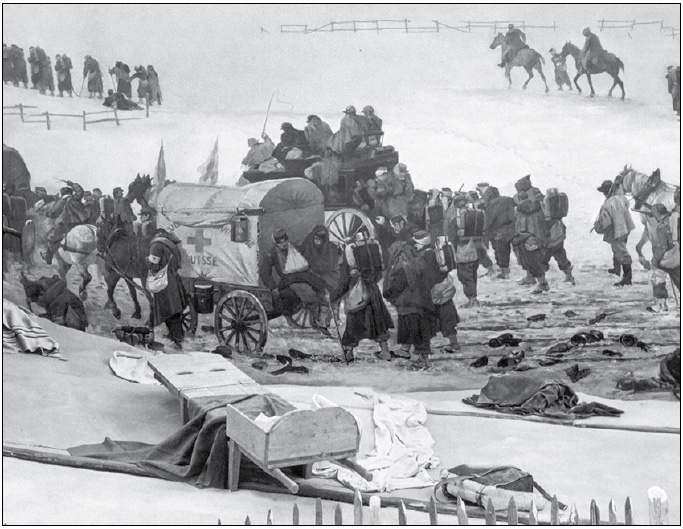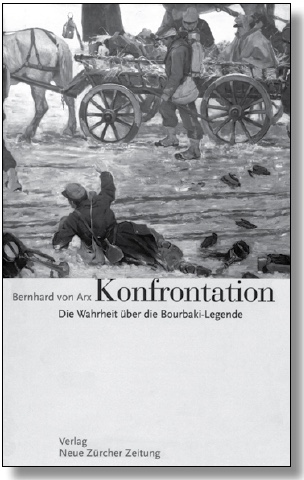Why I like to be a Swiss
Why I like to be a Swiss
by Wolfgang van Biezen
There he sat now on our sofa, the man from the State Secretariat for Migration. He made an appointment, he was friendly, and after assuring himself that my wife and I were living together, he wanted to know why I had waited so long to apply for naturalisation, especially since in my case it was an easy naturalisation. I had often asked myself this question for a long time. I hesitated with the answer. While we looked at each other friendly, my thoughts wandered to the book on Switzerland in the Franco-Prussian War of 1870/71, which I had recently read. Suddenly, in the immediate vicinity of the war, poorly equipped and with insufficient border patrol, Switzerland took up tens of thousands of soldiers at the request of the French Bourbaki army. The state and the population fulfilled their task as neutral neighbours so, just the way it was needed.

1870/71 – Switzerland is at war, although she does not want a war at all.
- The Swiss army is not ready and poorly equipped,
- Federal Councillor Welti behaves like a prince,
- Colonel Hans Herzog, popular with the people and competent, is basically forced by Welti to become a general,
- Herzog is elected by the Federal Assembly,
- the competences between the Federal Government and the General are not clear,
- no support from Federal Councillor Welti, intrigues,
- Herzog resigns (not sure if that works),
- the war between Prussia and France takes place on the border to the Swiss Confederation,
- parts of the French army are being annihilated,
- the Swiss border protection is only partially fulfilled due to the lousy equipped army,
- deception maneuvres at the border regarding the strength and commitment of the Swiss army,
- the Prussian general Manteuffel, better equipped, surrounds the Bourbaki army in France,
- Bourbaki‘s army is surrounded and to a large part in a desperate condition,
- the war shows its true, ugly face,
- Bourbaki makes a suicide attempt that fails,
- his army, surrounded by the Prussians, asks for admission to Switzerland,
- conditions that are compatible with neutrality are negotiated,
- Herzog is reinstated, giving conditions to Federal Councillor Welti,
- The Federal Council speaks unaware of the situation of a few thousand French soldiers,
- in fact, there are about 86,000 French soldiers seeking protection in Switzerland,
- they come in a completely exhausted state and are initially received by about 2,500 Swiss soldiers at the border,
- glad that they escape hell,
- guns are collected,
- wounded are hospitalised, for some help comes too late,
- Swiss soldiers are also becoming infected with dysentery and die,
- Horses are registered, distributed and transferred to farms so they can be cared for,
- 86,000 French will be distributed to all of Switzerland within a few days,
- great logistical achievement of General Herzog,
- rural Switzerland, after some initial hesitation, is happy for the helping French hands,
- here and there, very personal connections develop,
- the French behave themselves perfectly,
- the war between Prussia and France has ended,
- the wounded are healthy and recovered, the hungry well-fed, they are happy to go back to their homeland,
- the equipment, the weapons (rifles, guns), the horses, etc. are delivered to the new French Government,
- a bill of the Confederation over the expenses incurred is sent to the French Government and paid immediately,
- When the French are released after six weeks to their home, it comes sometimes to touching farewell scenes,
- 86,000 young men are saved, they are well and can return back to their lives.
… all this went through my mind when asked why I had waited so long to apply for naturalisation. Well, I told the Gentleman on our sofa that I thought long and hard about changing my citizenship. But after I realised what that meant for the people, the direct democracy, the perpetual armed neutrality and the good services it contained, for example, and that in fact I have more to say as a citizen of the Confederation, I mean more participation in the political events as in my former home country, well, I have decided to stay in this country and to become Swiss.
The Gentleman continued to look at me kindly, he just said, „Isn’t it so?“
(Translation Current Concerns)
Somehow, we understood each other. •
(Translation Current Concerns)
(Kopie 2)

[Translate to en:] … das alles ging mir durch den Kopf bei der Frage, warum ich denn so lange gewartet habe, einen Antrag auf Einbürgerung zu stellen. Nun, ich sagte dem Herrn auf unserem Sofa, dass ich lange und gut darüber nachgedacht habe, meine Staatsbürgerschaft zu wechseln. Aber nachdem ich begriffen hatte, was das für die Menschen bedeute, die direkte Demokratie, die immerwährende, bewaffnete Neutralität und die darin enthaltenen Guten Dienste zum Beispiel, und dass ich tatsächlich als Bürger der Eidgenossenschaft mehr zu sagen habe, will sagen, mehr am politischen Geschehen teilnehmen kann, als in meinem damaligen Heimatland, nun, da habe ich mich entschlossen, in diesem Land zu bleiben und Schweizer zu werden.
Der Herr schaute mich weiterhin freundlich an, er sagte nur: «Gaellet Sie?»
Irgendwie hatten wir uns verstanden. •
von Arx, Bernhard. Konfrontation. Die Wahrheit über die Bourbaki-Legende. Verlag Neue Zürcher Zeitung, NZZ Libro, ISBN 978-3-03823-744-0